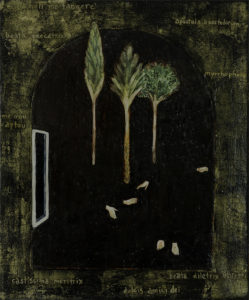
[Oval Hole in New Orleans Sidewalk, January, 2017]
I fell yesterday—on a shoveled-bare, brick and asphalt sidewalk maintained by Harvard University. Because of the icy sidewalks all over Somerville and Cambridge yesterday, I’d been wearing YakTrax; one coiled wire had apparently got caught in a gap between two sidewalk bricks and down I went! (Or so I assume. It all happened so fast.)
Two kind young men, a guy who’d been driving past in an Eversource van and a uniformed member of the Harvard University Police Department, instantly materialized and helped me to my feet. “Do you require medical attention?” the HUPD guy asked. “Is anything broken?”
“I think I’m okay,” I answered, already a little weepy. And hobbled home. An ice pack on my bunged-up right knee and under two quilts, I was still emotional. “I feel old,” I confessed to my husband.
Or, as Kathryn Schulz made clear in her recent, brilliant New Yorker essay, “Losing Streak: Reflections on two seasons of loss,” I lost something. In my case, I’d lost the pre-fall me’s confidence that with the right foul weather gear, the proper equipment, I could walk without incident; no problem. (Such insouciance! Such taking-for-granted! Such ingratitude!)
But, as Schulz points out, losing is what we do. “Loss is a kind of external conscience, urging us to make better use of our finite days.” Finite, indeed. I am definitely feeling that “finity” right now. And, oh, how precious!
Today, when I needed to mail some letters, as if preparing to scale a small mountain, I added a new piece of equipment to my gear: a walking stick. Gingerly, cautiously, still bruised and achy, I walked a half-block on a shoveled-to-the-concrete sidewalk and crossed the street to the mailbox. (Thanks, neighbors!) Crossing the street again, with the light, I heard a car behind me wanting to make a left turn—exactly where I was slowly walking. But instead of impatiently honking, I swear, because I was leaning on a sturdy branch I’d used on a real hike on a real, small mountain last summer, that driver waited. Patiently.
That I’d announced to that driver my need for extra care reminds me of one of my favorite poems; I’m also sharing it in honor of those two kind young men.
Title Poem— by Rainer Maria Rilke
It’s OK for the rich and the lucky to keep still,
no one wants to know about them anyway.
But those in need have to step forward,
have to say: I am blind,
or: I’m about to go blind,
or: nothing is going well with me,
or: I have a child who is sick,
or: right there I’m sort of glued together. . .
And probably that doesn’t do anything either.
They have to sing, if they didn’t sing, everyone
would walk past, as if they were fences or trees.
That’s where you can hear good singing.
People really are strange: they prefer
to hear castratos in boychoirs.
But God himself comes and stays a long time
when the world of half-people start to bore him.
(translated by Robert Bly)











